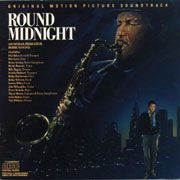
Round Midnight
Original Motion Picture Soundtrack
1986: Columbia CK 40464
Herbie Hancock, Ron Carter, Tony Williams, Bobby McFerrin
Dexter Gordon, Herbie Hancock, Pierre Michelot, Billy Higgins, John McLaughlin
Herbie Hancock, Pierre Michelot, Billy Higgins, John McLaughlin
Herbie Hancock, Pierre Michelot, Billy Higgins, Chet Baker
Dexter Gordon, Herbie Hancock, Pierre Michelot, Billy Higgins, Bobby Hutcherson, Wayne Shorter
Herbie Hancock, Pierre Michelot, Billy Higgins, Wayne Shorter
Herbie Hancock, Pierre Michelot, Billy Higgins, Lonette McKee, Dexter Gordon
Dexter Gordon, Freddie Hubbard, Cedar Walton, Ron Carter, Tony Williams
Herbie Hancock, Pierre Michelot, Billy Higgins, Dexter Gordon
Herbie Hancock, Bobby Hutcherson
Herbie Hancock, Ron Carter, Tony Williams, Bobby McFerrin
I got this probably not long after the film was released, initially on vinyl and then later on CD, because the moods of the film were such a haunting collision of emotions and abstractions (™ Joni Mitchell, for that reference) that I wanted to come back to it for repeat languid swims now and then. It’s still a treat of an album, lo these 30-plus years later, and I never tire of it although my appreciation for individual tracks shifts around over time. One remains consistently cherished, however: “Minuit aux Champs-élysées” is an absolutely magical gem, and its dreamy ending mesmerizes me to this day with its sonic impressions of rain-spattered urban cobblestones.
A recording that’s not on this album, nor on its companion release The Other Side of Round Midnight, is Sandra Reaves-Phillips’s slice of genuine lightly-raunchy vintage blues which is a core element of the party scene in the film. That performance is so damned good, in fact, that while watching it I tend to forget not only that she is not only not performing it in the 1950s as party number for fellow black/jazz musicians but also that she’s an actress doing it as a scene in a 1980s film. I’m a tough nut to crack when it comes to the whole suspension-of-disbelief thing, but that scene really does nail its atmospheric moment. And Reaves-Phillips gets to deliver a perfectly believable (on multiple time contexts) performance that has the welcome relief of making her otherwise negatively cast character someone we can really engage with and appreciate.
Comments © 2018 Mark Ellis Walker, except as noted, and no claim is made to the images and quoted lyrics.